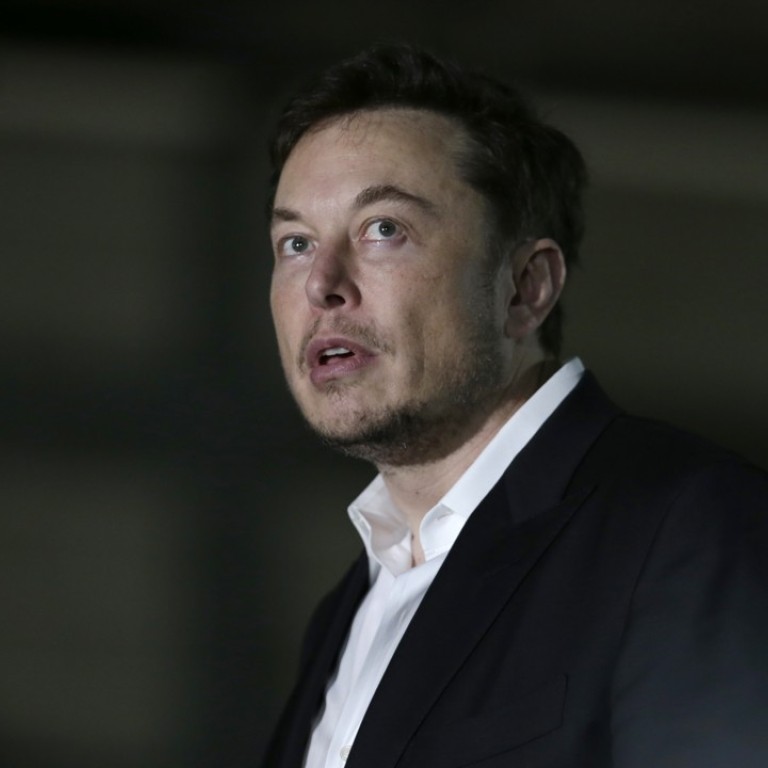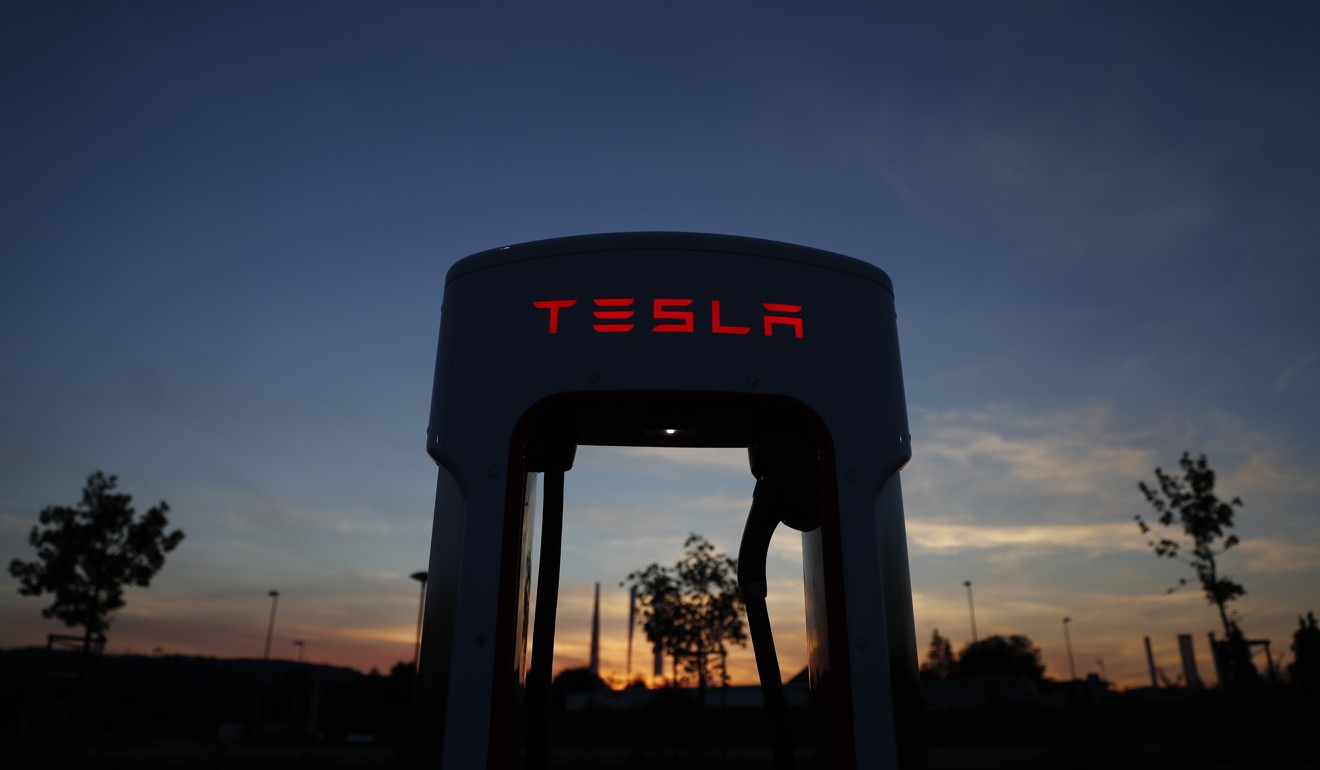
Tesla loses billions after founder Elon Musk reflects on ‘excruciating’ year and says ‘the worst is yet to come’
Musk sparked a furore in the markets, the media and among investors earlier this month when he tweeted his intentions to take his publicly traded company private
Tesla stock tumbled about 9 per cent on Friday, wiping billions off the company’s value, after CEO Elon Musk confessed that the past year of his professional life has been “excruciating” and that stress over his business has caused his health to deteriorate.
In an emotional interview with The New York Times, the Tesla founder also revealed that the pressures of work had caused him to spend his birthday stuck in the Tesla factory and almost miss his brother’s wedding. “This past year has been the most difficult and painful year of my career,” he said, and warned that “the worst is yet to come”.
Trading in Tesla suspended after Musk tweets about a plan to go private
Tesla shares closed at US$305.50, their lowest level since August 1, as analysts and business professors questioned whether the company’s board should grant Musk a leave or even replace him with a more seasoned CEO. The decline lopped US$5.4 billion off Tesla’s market value.
Musk, whose company posted a record US$709.6 million net loss in the first quarter of this year while struggling to manufacture large numbers of its Model 3 mass-market electric car, said in the interview that he had been working up to 120 hours a week and as a result his health had been “not great” and his friends had been worried about him.
I thought the worst of it was over. But from a personal standpoint, the worst is yet to come
“It’s kind of bizarre,” said Charles Elson, director of the corporate governance center at the University of Delaware. “It’s a drama we shouldn’t be watching.”
In the Times interview, Musk said there were times he didn’t leave the factory for three or four days at a time and days when he didn’t go outside.
He added that he spent the entire 24 hours of his 47th birthday in June at work and flew directly to his brother’s wedding, where he was due to be best man, from work, arriving two hours before the ceremony and leaving immediately afterwards.
Still, Musk – who has recently courted controversy with his erratic behaviour, including an unfounded accusation that an emergency rescuer in Thailand is a “pedo” – told the Times that he has no plans to give up his dual role as Tesla’s chairman and CEO.
Why Elon Musk sees shareholders as a distraction
“If you have anyone who can do a better job, please let me know. They can have the job. Is there someone who can do the job better? They can have the reins right now,” he told the paper.
Tesla’s board showed no sign of taking any action Friday. In a statement, the directors – excluding Musk himself, who is board chairman – praised his dedication to the company.
“Over the past 15 years, Elon’s leadership of the Tesla team has caused Tesla to grow from a small startup to having hundreds of thousands of cars on the road that customers love, employing tens of thousands of people around the world, and creating significant shareholder value in the process,” the statement said, without addressing Musk’s recent behaviour.
The Times interview puts board members in a difficult position because Musk, who entered Tesla as a major investor and built the company into a force that has changed the perception of electric cars, is the company’s public identity. He also has ties and relationships with most of the board members.
But Erik Gordon, a University of Michigan business and law professor, said Tesla’s board has a fiduciary duty to shareholders to take action.
Elon Musk apologises to British caver for ‘pedo’ slur
“If the board does not get him out of this slot at a minimum on a leave of absence basis, I think the board is going to be seen by a lot of people who love the company as being derelict in their duties,” Gordon said Friday. “You can love the company, you can love Musk and hate having him be the CEO at this point.”
Elson agreed: “At some point the board is going to have to assert its authority. They’re at a point where they’re going to have to distance their oversight from any prior relations.”
Musk sparked a furore in the markets, the media and among investors earlier this month when he tweeted his intentions to take his publicly traded company private, with the assurance: “Funding secured”.
Lawyers have warned that his tweet may have broken 14e-8 of the Securities Exchange Act of 1934, which prohibits publicly traded companies from announcing plans to buy or sell securities if executives don’t intend to complete, don’t have the means to complete, or are trying to manipulate the stock price.
Tesla’s stock rose by 11 per cent after the tweet. But last week, Musk was sued by investors, who claimed his tweets were misleading and were designed to “completely decimate” short-sellers, people who bet that Tesla’s shares will lose value.
It has also been reported that the US’s top financial watchdog had launched an investigation into Musk in light of his tweets.
In the interview with The New York Times, Musk blamed short-sellers, from whom he said he anticipated “a few months of extreme torture”.
“I thought the worst of it was over,” he told The New York Times. “But from a personal standpoint, the worst is yet to come.”
He also denied “being on weed” at the time of the tweet and said he saw it as an attempt at transparency, but admitted in the interview on Thursday that no one had seen or reviewed it before he posted it. Observers puzzled over the price he cited.
Musk explained that with an estimated premium over recent values, the share price should be around $419. He decided to round it up to US$420, he said – a number that is slang for cannabis.

“It seemed like better karma at US$420 than at US$419,” he said in the interview. “But I was not on weed, to be clear. Weed is not helpful for productivity. There’s a reason for the word ‘stoned’. You just sit there like a stone on weed.”
Musk, who is a controversial figure, has drawn further criticism this year for his tweets. Last month he launched an extraordinary attack on one of the British divers involved in the rescue of 12 boys and their football coach who were trapped in a cave in Thailand, baselessly calling the diver a “pedo” on Twitter.
In June, Musk caused outrage when he responded to a tweet from a woman who claimed Musk had used her father’s unicorn artwork on Tesla merchandise without compensation or attribution, by telling her: “He can sue for money if he wants, but that’s kinda lame”. Musk later settled the dispute with the artist.
Musk has also lashed out at both the media and analysts from large Wall Street banks in recent months, calling questions from analysts “boring, bonehead questions” and suggesting he would start a website to rank the credibility of individual journalists, after Tesla received negative press coverage.


